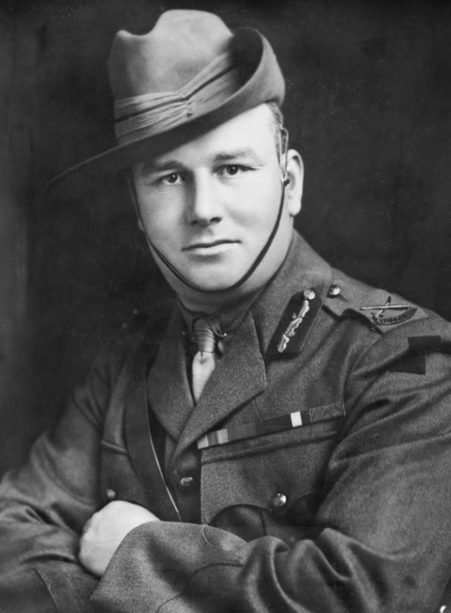Harold “Pompey” Elliott was Australia’s most famous fighting general of World War I and a renowned Ormond identity.
From country Victoria (Charlton initially, then Ballarat), he began at Ormond as a resident student in 1898, but interrupted his law course to serve in a bushmen’s contingent during the South African War, returning as Lieutenant Elliott DCM.
Back at Ormond for final-year law, he completed the course outstandingly, coming equal top and winning the Supreme Court Judges Prize. He became a solicitor, husband and father while his dedicated service in the militia led to advancement as an officer.

Brigadier Harold Edward “Pompey” Elliott, c.1914.
Elliott led the 7th AIF Battalion at Gallipoli, where he was wounded at the landing, and four of his men were awarded the VC at Lone Pine for remarkable bravery stimulated by his vigorous front-line leadership. Pompey, as his men dubbed him (Fred “Pompey” Elliott had been a prominent Carlton footballer), had become one of the AIF’s most renowned characters — brave, blunt, inspiring and a brilliant tactician.
Early in 1916 he was promoted to command the 15th Brigade, and led it with distinction at the Western Front, where he was conspicuous in notable AIF battles and various controversial episodes.
His brigade was shattered at Fromelles, a disaster he predicted and tried to have cancelled. No one was more influential in turning looming defeat into stunning success at Polygon Wood and Villers-Bretonneux.
After the latter triumph, however, he was bitterly chagrined to find himself overlooked for promotion when three divisional commands became vacant. Despite this disappointment he led his brigade with customary verve until the Armistice.
In 1919 he returned to Australia, and was elected to federal parliament when he topped the Senate poll in Victoria, an accomplishment he repeated in 1925. Frank and forthright as ever, he was too independently minded to be a minister, but was prominent throughout the 1920s in politics, the law and retrospectives of the war. He assisted returned soldiers whenever he could, and was Victoria’s most popular unveiler of war memorials.
Pompey remained involved at Ormond. He was president of the Old Ormond Students’ Association, unveiled the college’s war memorial, served on its council, and when financial difficulties threatened the publication of the Chronicle he funded the shortfall himself.
But the war cast a long shadow. He was suffering from post-traumatic stress disorder, his grievance about not being promoted in 1918 continued to fester, and he was appalled by the Great Depression’s consequences for too many Australians.
Pompey Elliott suicided in March 1931, aged 52.
The author, Ross McMullin, a former Ormond resident, wrote the award-winning biography Pompey Elliott, and assembled Elliott’s remarkable letters and diaries in Pompey Elliott at War: In His Own Words. Both books are available at Ormond’s Merchandise Store.
Share your Ormond story
Every Ormondian has their own unique experience of College life, and their own story to tell. What Ormond moment stands out in your memory? Was your time at Ormond shaped by Hugh Collins’s leadership? Whether on the sporting field or the stage, in the JCR, Dining Hall or on Picken Lawn, share your favourite story of life at Ormond College.

Recent Comments